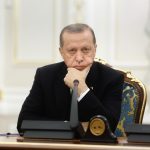by Derek Davison
Voters in Turkey went to the polls for parliamentary elections on June 7 and handed the ruling Justice and Development Party (AKP) a decisive defeat. While AKP remains the largest party in the Turkish parliament, the party lost 53 seats (from 311 to 258) and was unable to win an outright parliamentary majority for the first time since it was first voted into power in 2002. The election’s result has complicated Turkey’s short-term political situation considerably, as AKP leader Ahmet Davutoglu must now either form a coalition government or else new elections will need to be held. The election has probably ended the increasingly authoritarian Turkish President Recep Tayyip Erdogan’s plans for amending Turkey’s constitution to give more power to the country’s now-largely ceremonial presidency.
Turkey has also been a major player in the effort to remove Syrian dictator Bashar al-Assad from power. So its political situation also bears watching for how it may impact both the civil war in Syria and US efforts to counter the Islamic State (ISIS or IS).
I spoke last week with Gönül Tol, the founding director of the Middle East Institute’s Center for Turkish Studies, about why Erdogan has pursued regime change in Syria so fervently, and where Turkey’s Syria policy may be headed coming out of these surprising elections. She describes Turkey’s decision to involve itself in the conflict in Syria as a product of national security and economic concerns, as well as miscalculations on Erdogan’s part.
Erdogan’s Gamble
According to Tol, in 2011 Erdogan saw the rising conflict in Syria as a test of his grand vision for Turkey as a regional power as well as a threat to Turkey’s economic access to markets in Syria and throughout the region. Erdogan believed that he “had leverage over Assad,” as improving relations between the two countries had increased Turkish investment in Syria. Whatever leverage Ankara believed that it had over Damascus was obviously not enough to moderate Assad’s response to the Arab Spring protests, and Turkey became one of the first countries to formally condemn that response.
In doing so, Tol believes that Turkey relied on then-Foreign Minister Davutoglu’s estimate that Assad’s position in Syria was so weak that he would be forced from power in “less than six months.” That estimate was obviously mistaken.
However, national security considerations, specifically with respect to its large Kurdish minority, have really been the biggest driver of Turkey’s Syria intervention. Tol says that “things really changed for Turkey” in 2012, when Assad, unable to control the area himself due to pressure from rebel forces, effectively handed control over much of northern Syria to Kurdish forces under the Democratic Union Party (PYD). The PYD is affiliated with Turkey’s Kurdistan Worker’s Party (PKK), which has been waging a violent separatist campaign against the Turkish government since 1984. Ankara blames an uptick in PKK-related violence in 2012 (not without justification) on Assad’s decision to give the PYD/PKK their own safe haven along the Turkey-Syria border. At this point, according to Tol, “Syria became a domestic and national security issue” for Erdogan’s government, and ousting Assad became Turkey’s biggest foreign policy priority.
Conflict with Washington
Turkey’s position on Syria has put it at odds with the United States. As Tol suggests, Erdogan “has been frustrated with the U.S.,” specifically with the Obama administration’s reluctance to fully embrace regime change for fear that Islamist extremists, like IS or the al-Qaeda-linked Nusra Front could replace Assad. Ankara, in contrast, has seen such extremist forces, which have been among the most effective fighters in the broad anti-Assad movement, as a “tool” against Assad and the Kurds, as Tol put it, and it “turned a blind eye toward and even supported the Islamic State.”
Recent reports have suggested that Turkey, alongside wealthy Persian Gulf countries like Saudi Arabia and Qatar, has been aiding elements of the rebel side like the Army of Conquest coalition that recently seized control over Syria’s northern Idlib Province and that contains extremist elements like Nusra and the ideologically similar Ahrar al-Sham. Tol believes that Erdogan remains convinced, even after seeing IS’s string of successes in neighboring Iraq, that Islamic extremism “could never really take root in Syria,” and that once Assad is out of power it will be easy to isolate and deal with extremist forces.
This dynamic has continued to play itself out in recent days. US and anti-IS coalition airstrikes supported a primarily Kurdish offensive that drove IS out of the border town of Tal Abyad and cut off one of the extremist group’s most important routes for supplies and foreign recruits entering Syria from Turkey. But despite the fact that Turkey is ostensibly part of the American-led anti-IS coalition, its reaction to IS’s defeat in Tal Abyad has been resoundingly negative. Erdogan has called the Kurdish victory there “a threat to our borders,” partly due to the influx of refugees that the fighting generated but primarily because possession of Tal Abyad allows the PYD to link the areas under its control in the Syrian border area that Kurds refer to as Rojava. Erdogan has questioned whether the West is “sincere,” arguing that the coalition “bombs the Arabs and Turkmens” and “unfortunately places the terrorist PYD and PKK in Tal Abyad.”
Electoral Coalition or New Elections?
According to Tol, any coalition that emerges from the elections will likely take a less interventionist approach to Syria. “A weakened AKP will be less likely to pursue an aggressive Syria policy,” she argues, since “all opposition parties have been critical of Syrian policy” and the public thinks Turkey is “too involved.” Indeed, some of AKP’s heaviest electoral losses came in towns along the Syrian border that have been most affected by the war in Syria and whose residents have come to blame Erdogan’s intervention for exacerbating the crisis.
An AKP coalition with the People’s Democratic Party (HDP), a heavily Kurdish party that was the surprise of the election (winning 80 seats where it had none before) would require the biggest change from Ankara, as it would require AKP and Erdogan to stop trying to block Kurdish gains. But HDP’s leadership has already ruled out joining a coalition. According to Tol, though, either of the other two parties – the centrist Republican People’s Party (CHP) or the far right Nationalist Movement Party (MHP)—which is AKP’s likeliest coalition partner but which has placed conditions on its participation – is likely to put less emphasis on regime change than on border security (for example, by giving prosecutors a freer hand to arrest and prosecute people ferrying weapons and recruits into Syria via Turkish border crossings). This would likely mean less support for Islamist groups in Syria and would bring Ankara’s Syria policy more in line with Washington’s. As Tol puts it, “the election result is a low for AKP but is good for Turkish democracy, and a democratic Turkey will be less likely to work with groups like IS and Nusra.”
However, Tol predicts that the far more likely outcome of the election (“60-65 percent,” she says) is that no coalition will be formed and new elections will have to be called. In that event, the AKP might be able to regain its sole majority, albeit at a slim margin. A Turkish pollster, MAK, claims that AKP would win roughly 44% of the vote in new elections, up from the 40.9% it won on June 7. This would probably be enough to get it over the 276-seat mark required for a parliamentary majority. In that case, Tol contends that it is unlikely that Ankara would make any change to its Syria policy, as Erdogan is “too heavily invested in the opposition and in getting rid of Assad” to change course now unless he is forced. This would likely be good news for Syrian rebels, particularly IS and Nusra, but as Tol says, “not good news for US-Turkey relations.”






A lot of good points in this article, but one that I think the author is mistaken in suggesting that Assad’s opposition to what was a manufactured ‘orange revolution’ in Syria as Erdogan’s motivation for supporting the mercenaries in Syria. I would suggest that more important was Erdogan’s vision of Turkey as the regional hegemon with Syria in a vassal relationship irrespective of the ‘revolution’, and Turkey as the exclusive energy hub from the Middle East and Central Asia for delivering oil and gas to Southern Europe, where an important pipeline in this scheme proposed to run from Qatar through Syria to Turkey was opposed by Assad in favor of a competing pipeline from Iran through Iraq to Syria that would bypass Turkey entirely. Add to that Turkey’s and Qatar’s mutual support of the Muslim Brotherhood, and Turkey’s membership in NATO with its NATO bases from which its operations in Syria could be coordinated (e.g. Incirlik), plus Turkey’s uneasy relationship with Iran (Turkey being one of four regional hegemons- the others being Israel, Saudi Arabia and Iran), and one can imagine an expansionist Erdogan as ready to loot Syria if he could get away with it.
So far it hasn’t worked, even if it has created horrendous devastation, and I cannot imagine Russia and China permitting it to happen, even if the U.S., Saudi Arabia, Qatar and Israel would want it so. (There are even signs now- or at least the hope of it- in recent dealings between Russia and Saudi Arabia- i.e., in a recently announced nuclear deal at SPIEF- that the Saudis could moderate their opposition to Iran and their involvement in Syria. We’ll see.)